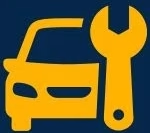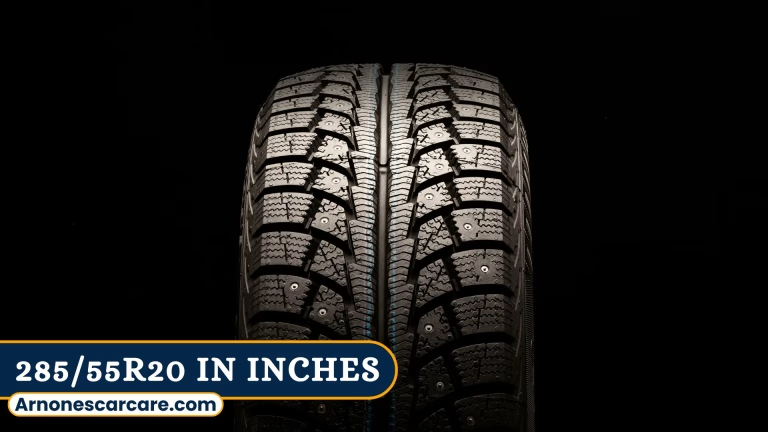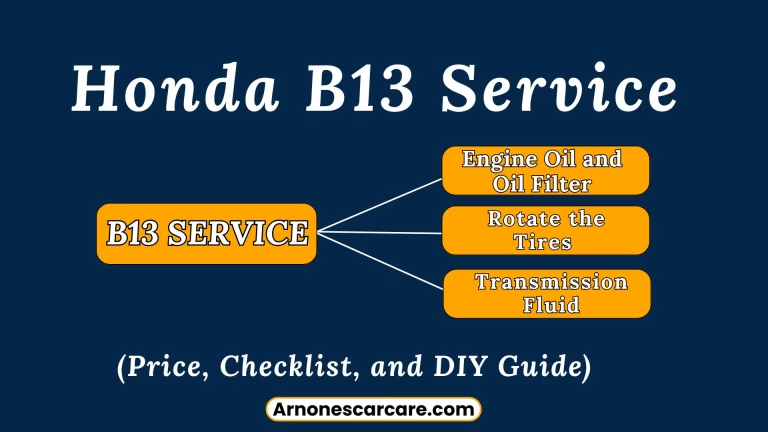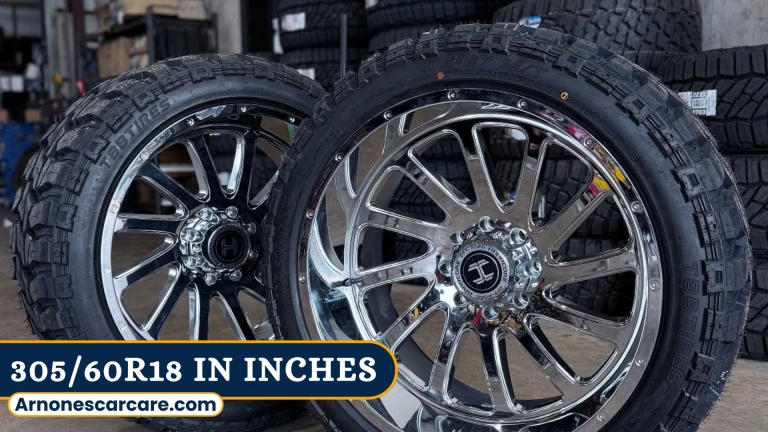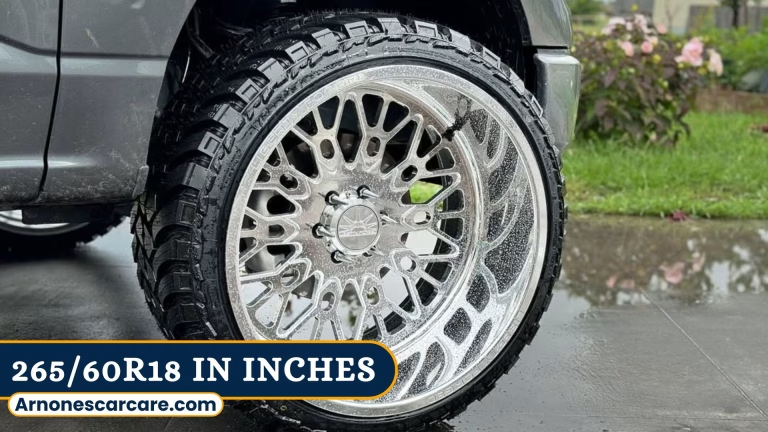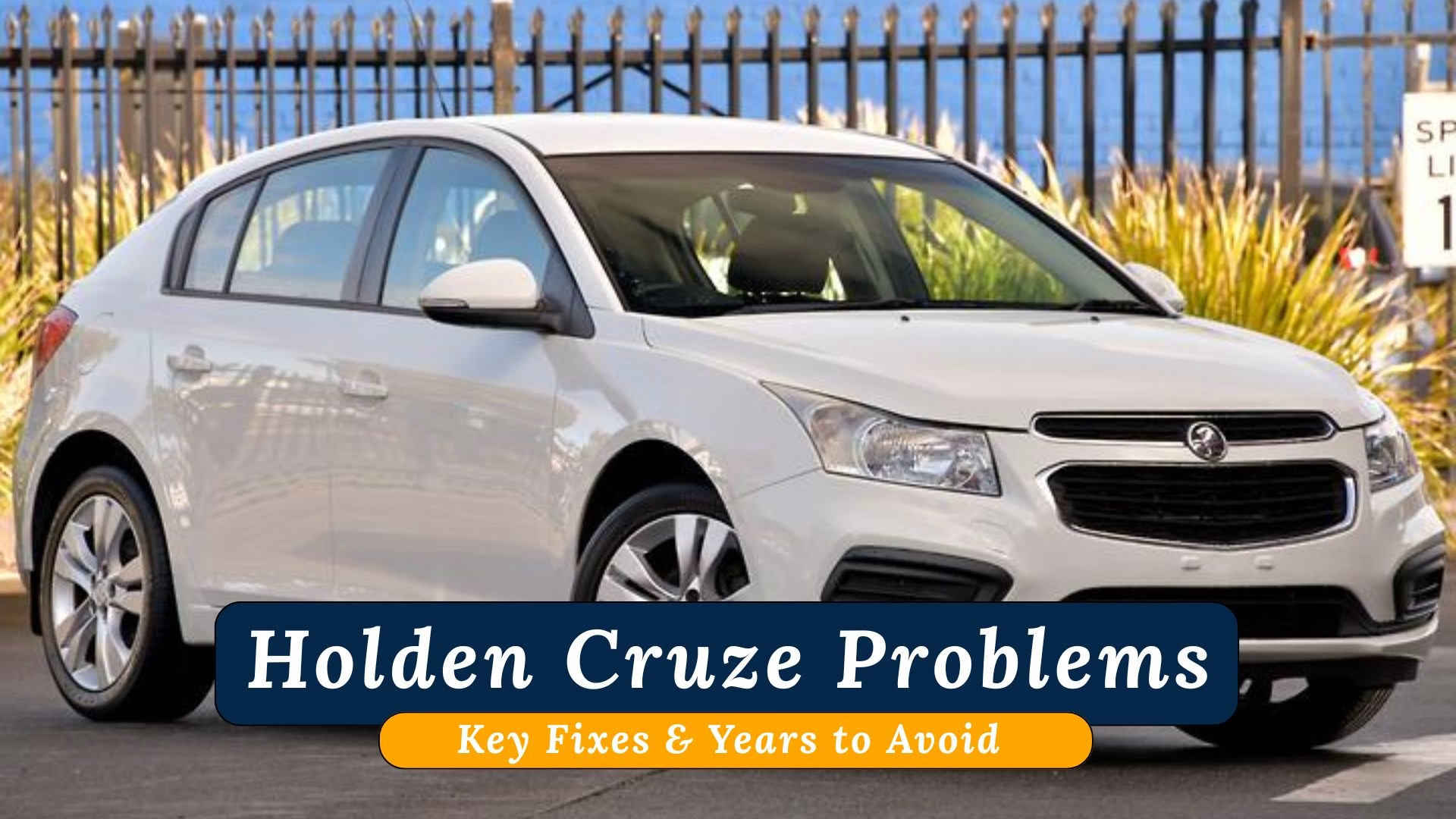
The Holden Cruze, a compact car produced from 2008 to 2017, was known for its affordability, fuel efficiency, and modern design. Holden Cruze Problems can affect various aspects of the vehicle, from engine and transmission issues to electrical malfunctions.
These common problems have been reported across multiple model years, with certain years being more prone to specific faults. Understanding these issues and knowing the worst years to avoid can help potential buyers and current owners address repairs early and keep their Cruze running smoothly.
Overview of the Holden Cruze
The Holden Cruze was a compact car produced by Holden from 2008 to 2016. It was available as a sedan, hatchback, and station wagon. The car was originally designed by Daewoo and later adopted by General Motors (GM). Production for the Australian market began in South Korea but moved to Adelaide in 2011.
The Cruze had a modern design, a spacious interior, and various engine options. It was a popular choice due to its affordability, fuel efficiency, and safety features. Over time, it received several updates to improve performance and technology. Production ended in 2016, and it was replaced by the Holden Astra.
Key Components
The Holden Cruze had various engine options, advanced safety features, and modern technology. It offered both manual and automatic transmissions, with different trims suited for economy or performance. However, some common issues affected reliability.
- Engine Options
- 1.8L Petrol – Basic and fuel-efficient.
- 1.4L Turbo Petrol – More power and smooth performance.
- 2.0L Turbo Diesel – Best for long drives and fuel economy.
- 1.6L Turbo Petrol (SRi-V) – Sporty and powerful.
- Transmission
- 5-Speed Manual – Basic models.
- 6-Speed Auto – Most common.
- 6-Speed Manual – Found in sportier versions.
- Safety Features: The Cruze was designed with modern safety technology to protect passengers. It had multiple airbags, stability control, and traction control to prevent skidding. Higher trims also had rear parking sensors and a camera.
- Interior & Tech: The interior was comfortable and well-equipped, especially in higher trims. It featured leather seats, a 7.0-inch touchscreen with Bluetooth, and cruise control for easy highway driving.
- Exterior: The Cruze had a sleek and modern design, with alloy wheels and LED daytime running lights for better visibility and style.
- Common Issues: Despite its features, the Cruze had some reliability problems. Owners reported coolant leaks, overheating, transmission issues in automatics, and clogged diesel filters. Some models were also affected by the Takata airbag recall.
Most Common Holden Cruze Problems and Their Causes
The Holden Cruze has been known for various issues that many owners have reported over the years. These problems can affect the vehicle’s performance, safety, and reliability. Below is a breakdown of the 10 most common Holden Cruze problems, their causes, and possible solutions.
1. Transmission Issues (2011–2014 Models)
One of the most common Holden Cruze problems is automatic transmission failure, especially in models from 2011 to 2014.
Symptoms:
- Hard shifting – Gear changes feel rough and require extra effort.
- Delayed shifting – The car takes longer than usual to switch gears.
- Slipping gears – The transmission struggles to maintain speed, leading to power loss.
Causes:
- Low or dirty transmission fluid – Leads to overheating and gear problems.
- Faulty torque converter or solenoids – Disrupts power transfer and shifting.
- Clogged transmission filter – Prevents proper fluid circulation.
Fixes & Prevention:
- Check and replace transmission fluid regularly to keep it clean.
- If shifting feels rough, have a mechanic inspect the torque converter and solenoids.
- If the problem worsens, a transmission rebuild or replacement may be necessary.
2. Engine Overheating
An overheating engine can lead to serious damage if ignored.
Symptoms:
- High temperature gauge readings.
- Coolant leaks under the car.
- White smoke from the exhaust (possible head gasket failure).
Causes:
- Faulty thermostat – Blocks coolant flow, leading to overheating.
- Water pump failure – Prevents proper coolant circulation.
- Radiator issues – Clogs or leaks reduce cooling efficiency.
Fixes & Prevention:
- Check coolant levels and top up when needed.
- Flush the cooling system every few years to remove debris.
- If overheating continues, inspect the thermostat, radiator, and water pump for issues.
3. Steering Problems
Steering issues can make driving dangerous and uncomfortable.
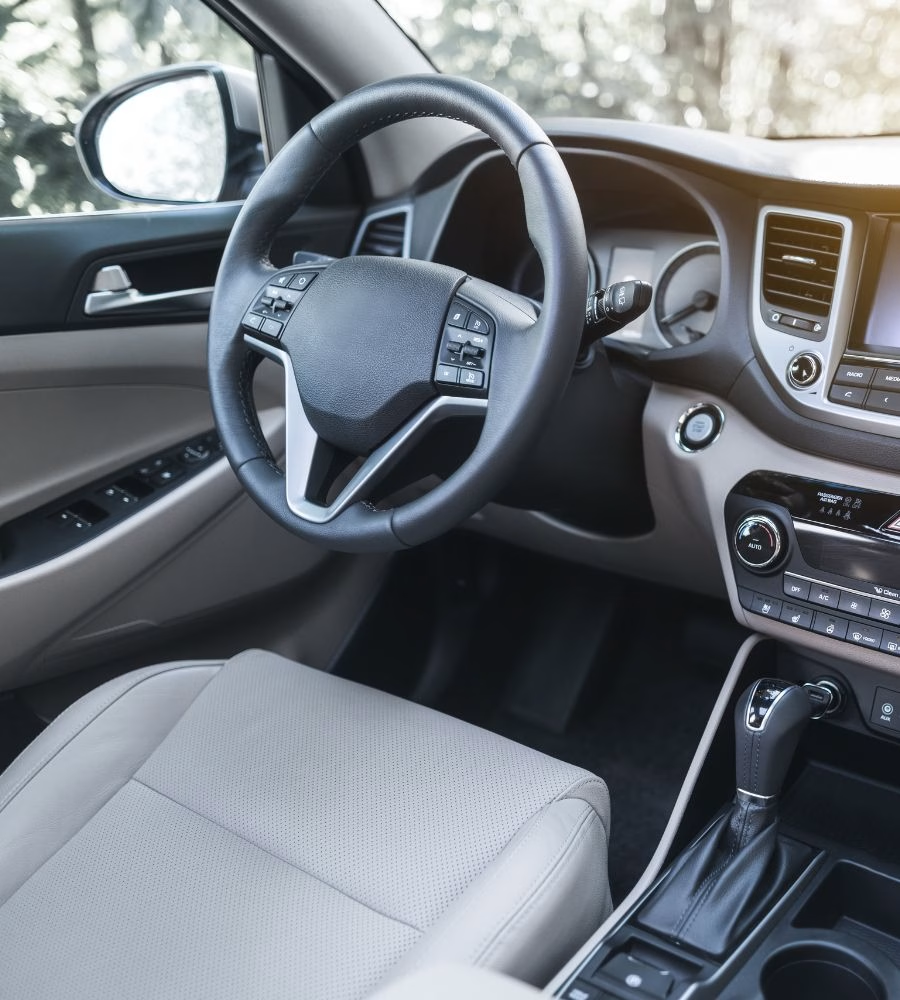
Symptoms:
- Hard to turn the steering wheel, especially at low speeds.
- Whining or groaning noises when turning.
- Unresponsive or stiff steering.
Causes:
- Low power steering fluid – Leads to stiff steering and noise.
- Faulty steering pump – Reduces power assistance.
- Steering rack problems – Causes unresponsive steering.
Fixes & Prevention:
- Top up power steering fluid if levels are low.
- If you hear whining noises, have the steering pump checked.
- If the steering rack is failing, a professional repair is required.
4. Electrical System Issues
Electrical problems can lead to starting issues and power failures.
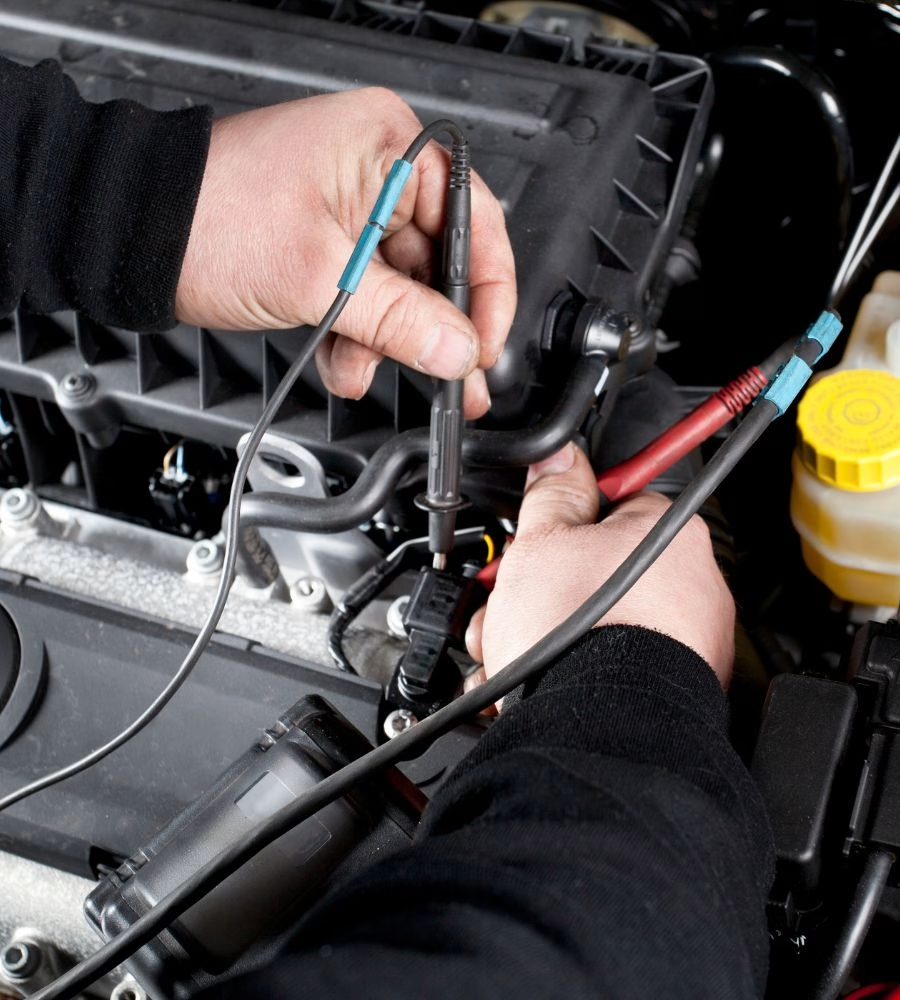
Symptoms:
- Battery drains quickly or dies unexpectedly.
- Alternator failure – Car struggles to start or dashboard lights flicker.
- Dim headlights or faulty sensors.
Causes:
- Old or weak battery – Can’t hold a charge properly.
- Faulty alternator – Fails to charge the battery while driving.
- Corroded or loose wiring – Interrupts electrical connections.
Fixes & Prevention:
Test your battery and alternator regularly.
Clean corroded wiring and replace old fuses if needed.
If electrical issues persist, inspect the ECU (Engine Control Unit) for faults.
5. Brake Problems
Brakes are a critical safety component, and failure can be dangerous.
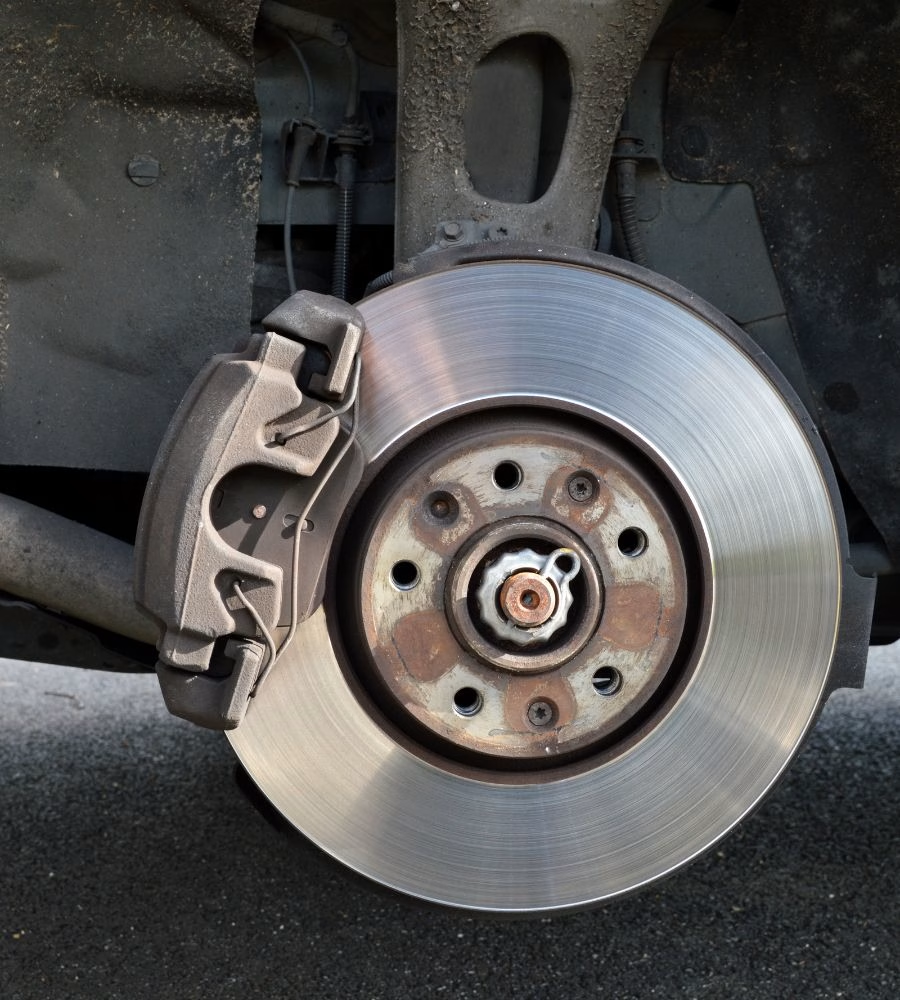
Symptoms:
- Brake warning light stays on.
- Leaking brake fluid.
- Unusual noises like grinding or squealing.
Causes:
- Worn-out brake pads – Reduce stopping power.
- Leaking brake fluid – Due to failing master cylinder or calipers.
- ABS (Anti-lock Braking System) failure – Affects braking performance.
Fixes & Prevention:
- Replace worn-out brake pads before they affect braking power.
- Check brake fluid levels and look for leaks.
- If the ABS warning light comes on, have the system checked.
6. Cylinder Head Issues
The cylinder head plays a vital role in the engine’s function.
Symptoms:
- Coolant leaks into spark plug chambers.
- Persistent overheating issues.
- White smoke from the exhaust.
Causes:
- Overheating due to cooling system failure.
- Cracked cylinder head – Can cause internal coolant leaks.
Fixes & Prevention:
- If overheating persists, check for head gasket failure.
- Replace a cracked cylinder head to prevent engine damage.
7. Timing Chain/Belt Issues
A worn timing chain or belt can lead to severe engine damage.
Symptoms:
- Rattling noise from the engine.
- Poor engine performance or misfires.
- Check engine light comes on.
Causes:
- Worn-out timing chain tensioner.
- Damaged lifters.
- Poor maintenance or improper refitting.
Fixes & Prevention:
- Replace timing belts/chains at recommended intervals.
If you hear rattling, get the timing system checked immediately.
Have a professional mechanic handle replacements to avoid errors.
8. Oil and Cabin Air Filter Issues
Filters play a crucial role in keeping the engine and cabin free from contaminants. A clogged or dirty filter can affect performance and air quality.
Symptoms:
- Reduced engine performance due to dirty oil.
- Poor cabin air quality, leading to unpleasant odors.
- Increased engine wear due to unfiltered contaminants.
Causes:
- Old or clogged oil filter – Allows debris to enter the engine.
- Blocked cabin air filter – Reduces airflow to the AC system.
Fixes & Prevention:
- Replace the oil filter regularly during oil changes.
- Change the cabin air filter every 15,000–25,000 miles.
- Inspect filters during routine maintenance and clean them if necessary.
9. Fluid Leaks and Low Fluid Levels
Fluids such as coolant, power steering fluid, and brake fluid are essential for the smooth operation of the vehicle. Leaks or low levels can lead to major system failures.
Symptoms:
- Visible fluid leaks under the car.
- Difficulty steering or braking.
- Overheating due to coolant loss.
Causes:
- Worn-out gaskets and seals – Lead to leaks.
- Failing components like the master cylinder or power steering pump.
- Old or contaminated fluids that degrade over time.
Fixes & Prevention:
- Regularly check fluid levels and top up when necessary.
- Inspect for leaks around the engine, transmission, and brake system.
- Replace fluids at recommended intervals to prevent system failures.
10. Fuel System Malfunctions
Issues with the fuel system can cause reduced engine power, poor fuel efficiency, and even stalling.
Symptoms:
- Engine misfires or stalls while driving.
- Difficulty starting the car.
- Poor fuel economy.
Causes:
- Clogged fuel filter – Prevents proper fuel flow.
- Faulty fuel pump – Reduces fuel pressure to the engine.
- Dirty or failing fuel injectors – Affect combustion efficiency.
Fixes & Prevention:
- Replace the fuel filter every 50,000 miles.
- Use high-quality fuel to prevent carbon buildup in injectors.
- Clean or replace the fuel injectors if performance declines.
11. Air Conditioning System Failures
The air conditioning (AC) system in the Holden Cruze is known to develop problems, leading to discomfort while driving.
Symptoms:
- Weak or warm airflow from vents.
- Unusual noises when turning on the AC.
- Foul odors coming from the vents.
Causes:
- Low refrigerant levels – Leads to poor cooling performance.
- Clogged cabin air filter – Reduces airflow.
- Faulty AC compressor – Prevents the system from functioning.
Fixes & Prevention:
- Check refrigerant levels and recharge if needed.
- Replace the cabin air filter if airflow is weak.
- If the AC still doesn’t work, have the compressor inspected.
12. Software and Sensor Malfunctions
Modern vehicles rely on sensors and software to regulate performance. Faulty sensors or software glitches can cause warning lights and erratic behavior.
Symptoms:
- Check engine light or other dashboard warnings.
- Sudden power loss or limp mode activation.
- Unresponsive or malfunctioning electronic features.
Causes:
- Faulty oxygen sensor – Affects fuel mixture and efficiency.
- Malfunctioning throttle position sensor – Leads to acceleration problems.
- Software bugs – Cause warning lights and system errors.
Fixes & Prevention:
- Reset the vehicle’s software after repairs.
- Scan for error codes to identify faulty sensors.
- Update the ECU software if recommended by the manufacturer.
Holden Cruze Years to Avoid & Their Issues
If you’re thinking about buying a used Holden Cruze, it’s important to know that not all model years are created equal. Some years are notorious for repeated mechanical and electrical failures, making them costly and unreliable choices. Here’s a breakdown of the worst model years and why you should avoid them.
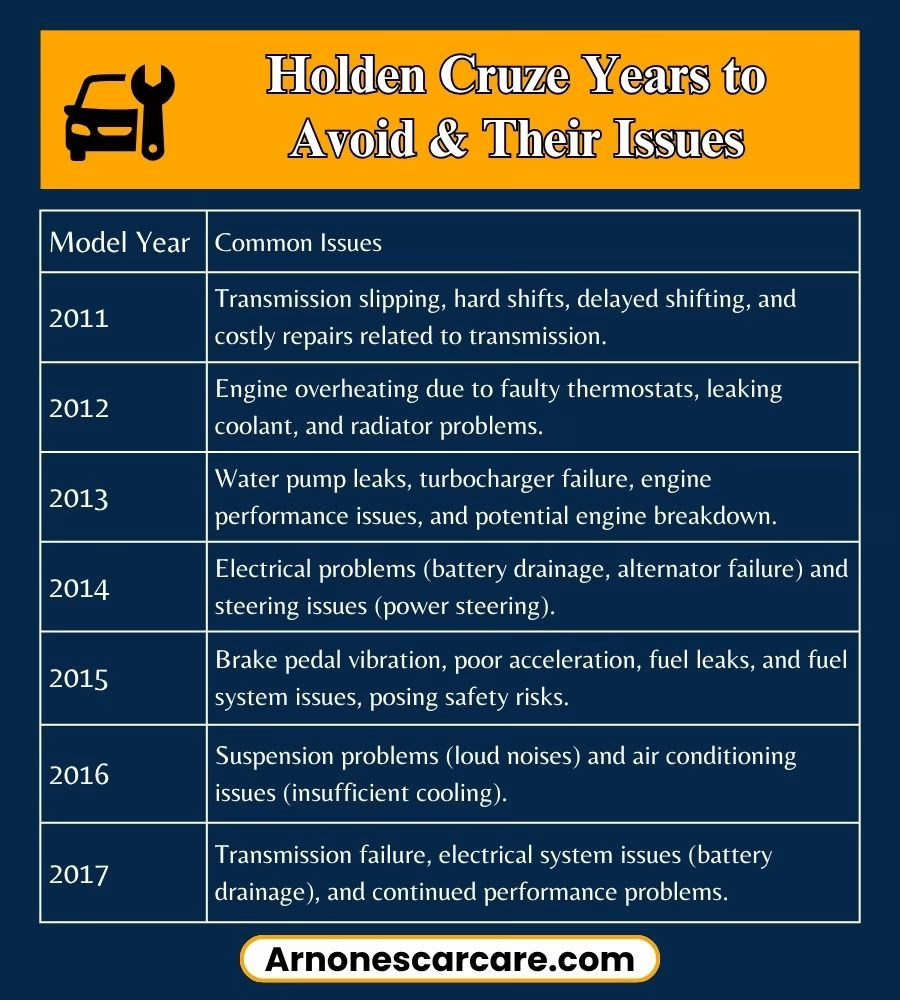
2011 Model Year:
This year is notorious for significant transmission problems. Owners have reported issues such as transmission slipping, hard shifts, and delayed shifting, which can lead to a frustrating driving experience and expensive repairs if not addressed early on.
2012 Model Year:
In this year, many vehicles experienced engine overheating issues. This typically stems from faulty thermostats, leaking coolant, and radiator problems. When the engine doesn’t cool properly, it can lead to costly damage and potential engine failure.
2013 Model Year:
The water pump and turbocharger issues became prominent in the 2013 models. Leaking coolant and turbo failure were common, resulting in significant engine performance problems and even engine breakdowns if not repaired in a timely manner.
2014 Model Year:
Electrical problems and steering issues were widely reported in 2014 models. Drivers often experienced battery drainage, alternator failure, and difficulties with power steering, which affected the car’s overall functionality and safety on the road.
2015 Model Year:
Brake and fuel system issues became prominent, with symptoms such as brake pedal vibration, poor acceleration, and fuel leaks. These issues pose serious risks to both safety and the car’s efficiency.
2016 Model Year:
This year faced issues with the suspension and air conditioning system. Drivers reported loud suspension noises, as well as insufficient cooling from the A/C, which can make driving uncomfortable and handling difficult.
2017 Model Year:
Although improvements were made, the 2017 Holden Cruze continued to experience transmission and electrical system problems. Issues like transmission failure and continued battery drainage persisted, impacting both performance and reliability.
How to Spot a Reliable Used Holden Cruze?
Here’s how to find a reliable used Holden Cruze:
- Check the Service History: Ensure regular maintenance (oil changes, transmission service). Avoid cars with no service records.
- Inspect for Common Problems :Watch for transmission slipping, engine overheating, and electrical issues.
- Check for Recalls & Past Repairs: Use the VIN to verify any recalls or major repairs done on the car.
- Look for Wear & Tear: Pay attention to the mileage and condition of the car.
- Test Drive: Listen for unusual noises and ensure smooth braking and steering.
When to Seek Professional Help?
Some Holden Cruze issues are more complex and require a professional mechanic. Here’s when to seek expert help:
- Transmission Problems: If you’re experiencing delayed shifting, slipping gears, or hard shifting, it may indicate a serious issue with the transmission that needs professional attention.
- Engine Overheating: If your engine keeps overheating despite coolant refills, it could be a faulty thermostat, water pump failure, or radiator issue that requires a mechanic’s expertise.
- Electrical Issues: Battery drainage, alternator failure, or malfunctioning electrical components like fuses or sensors need a technician for proper diagnosis and repair.
- Steering Problems: If your steering feels heavy, makes unusual noises, or you notice fluid leaks, it’s time to have the steering system checked by a professional.
- Brake Issues: If you feel vibrations in the brake pedal, hear grinding noises, or notice fluid leaks, have a mechanic inspect the brake system right away.
- Timing Chain/Belt Concerns: If the timing chain tensioner is worn or you notice damaged lifters, it’s best to seek professional help as this requires specialized tools and knowledge.
- Cylinder Head Issues: If you see coolant leakage into the spark plug chamber or experience engine misfires, the cylinder head may need professional repair or replacement.
How to Prevent Holden Cruze Problems?
Preventing Holden Cruze issues comes down to regular maintenance and early detection of problems. Here’s a quick checklist to help:
- Coolant: Check levels regularly to prevent overheating. Ensure the radiator, hoses, and water pump are in good condition.
- Transmission Fluid: Keep it at the right level to avoid shifting problems. Change every 30,000 to 60,000 miles.
- Brakes: Inspect brake pads and fluid for leaks. Replace worn pads early to avoid safety issues.
- Battery & Alternator: Check for corrosion and ensure the alternator is charging properly.
- Tires & Suspension: Regularly check tire pressure and tread. Keep the suspension in top shape for better handling.
- Oil: Change oil regularly to keep the engine running smoothly.
FAQs
Q. What is the most common problem with the holden cruze?
Common issues include transmission problems, engine overheating, steering issues, and electrical system failures.
Q. What is the problem with the 1.8 engine in the Holden Cruze?
The 1.8 engine often faces cracked cylinder heads.
Q. Is a Holden Cruze a Daewoo?
Yes, the Holden Cruze is based on the Daewoo Lacetti platform.
